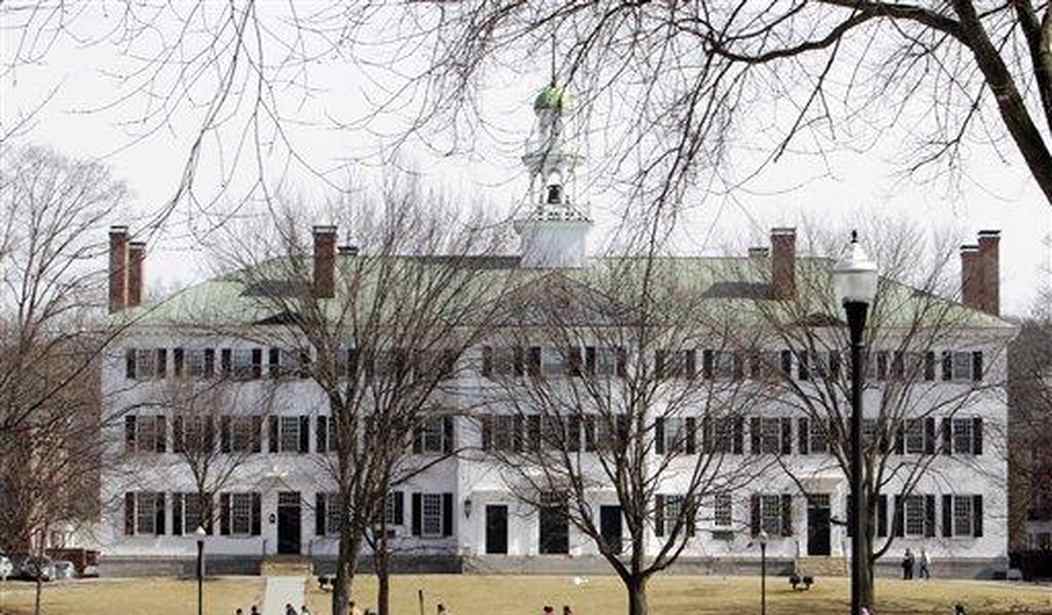What if Ivy League campuses suffered from horrific crime rates that plague many of America's inner cities? Would progressive professors and students at these elite universities have different opinions about the complex problems of policing and the most basic foundation of any civilization, law, and order?
I spent two years at Dartmouth College, getting an MBA. I didn't care much for the insufferable snootiness I encountered there. But Hanover, NH, is an exceptionally charming small New England town we often associate with a Norman Rockwell painting. I've been worldwide, and Hanover was the safest place ever.
There are about 10,700 people who make up the Dartmouth community: around 6600 students, about 3200 staff, and a bit over 900 professors. I could find no record of any on-campus murders, ever. (There was an off-campus double homicide involving two professors in 2002 and another double homicide off-campus involving two students in 1991. In both cases, the perpetrators were not members of the Dartmouth community.) In brief, Dartmouth is a remarkably safe place. No reasonable person would fear for their safety walking across Dartmouth's famously scenic campus.
What if Dartmouth had the same homicide rate as Jackson, MS? In 2022, "The City with Soul" had 133 homicides versus a population of just under 150,000. That's a rate of 88.6 homicides per 100,000 population. Bear in mind 2022 was a significant improvement over 2021's 153 homicides.
Applying that 88.6 figure to Dartmouth's total population would work out to 9.5 homicides on-campus annually. It looked at another way, that would be about one homicide a month during the academic year.
What if Dartmouth had the same homicide rate as Baltimore's Sandtown-Winchester neighborhood? Then you could expect about two dozen homicides annually, plus another thirty rapes and somewhere in the area of a few thousand or more robberies and cases of aggravated assault.
Recommended
It's almost amusing to imagine how the kind of corn-fed, prep school-educated kids who attend Dartmouth would cope in such an environment. (What is hilarious is how their parents in the uber-wealthy suburbs would feel about sending their precious ones into an active war zone where nobody has heard of the Geneva Convention.)
For this thought experiment, let's assume you can't just transfer to Cornell (oh, the shame) or get another teaching post at another posh university. Like the residents of Sandtown-Winchester, you're stuck there for at least four years. Would campus attitudes about policing and community safety change at all?
People are famously resistant to changing their minds about articles of faith. So I'd bet it wouldn't be until the end of the sophomore year before most Dartmouth students began to see things in a new light. But in two years, close to a majority would have been the victim of violent crime, and many would know someone personally who had been murdered. Enough hard lessons and I bet even Ivy League undergraduates would wise up.
The professors? Even after a million years of carnage, Pshaw would still be blathering about "police brutality" and calling for "more counselors, more caseworkers, and fewer police." I remember getting an email from Dartmouth about a year ago highlighting a professor who, with fiery eloquence, described her deep fears every time her fourteen-year-old son went down to the food co-op that he'd be gunned down on the street by racist Hanover cops. You can't make this stuff up.
Now, the parents would from Week Two be demanding a full-blown hard-hitting police crackdown. Bad-ass tactical units, campus-wide sweeps for suspects, they'd want the cops breaking down doors and taking names. And they wouldn't mind if some perps got banged up in a bit of an interrogation. All they'd want is for their children to be safe and go about life without constant fear and mortal danger.
But, of course, this isn't how the world works. For the pampered poodles who occupy ivory towers, the world is simple. Violent street crime is a mere abstraction, something far away and airy-fairy intangible. What matters more, concrete and vitally important, is publicly taking a moral stand for "justice" and "equity." And in a cartoonish intellectual universe, cops are easy to decry as cartoon villains.
It would all be harmless enough if such ridiculous campus fantasies were limited to college campuses. But the fact is that the graduates of elite colleges and universities disproportionately populate the media and the higher levels of government. Rachell Maddow and Anderson Cooper took to heart the social justice mantras they learned at Stanford and Yale. Have you ever experienced what life is like in a high-crime neighborhood, where you live in fear for your life every day? I doubt it.
You can't understand what you can't understand. I lived in such an urban high-crime neighborhood, Fort Green Park in Brooklyn, back in the late 80s. I was quickly instructed at Dartmouth that merely commenting that crime was high in a high-crime neighborhood was an unacceptably racist thing to say. At Dartmouth, unpleasant facts were something polite people didn't discuss openly.
There are no easy answers to the problem of the ever-present curse of violent crime that has engulfed all too many communities. But as long as those who are so richly privileged, those who run this country, have no clue whatsoever about the real dilemmas real people face; we can't even ask what the right questions are. And meanwhile, more innocent people, grandmas, and mothers and children among them will continue to suffer and sometimes die from violence we would as a society never tolerates in our communities.
Mark Nuckols is the author of The AOC Conspiracy, just published and available on Amazon.

























Join the conversation as a VIP Member